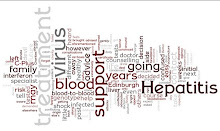To kick off with...here is an article I wrote recently for a Scottish newspaper.
They say your past eventually catches up on you – and that it often happens when you least expect it. It was a terrible shock to be told that a potentially life-threatening virus had been lurking in my bloodstream for the past twenty-five years and that for all those years, I’d been a risk to others – well, it’s the stuff of nightmares.
In the summer of 2007, I had made the decision to dedicate the future to me. I had brought up a large family and finally had the chance to start a career that didn’t involve the juggling and complications that family life demanded. The future looked bright. I heard on the car radio an appeal for blood donations & decided to donate, even producing a certificate to prove that recent acupuncture treatment had been done under the strictest of hygiene standards. The next day, over the telephone, a kindly voice from the blood bank urged me to come back straight away. I wasn’t overly concerned; after all, what could possibly be wrong? I believed I was perfectly healthy – I led a healthy lifestyle, didn’t drink much alcohol and didn’t smoke.
The doctor in charge, gently but gravely, broke the news that I had hepatitis C – a blood- borne virus that can only be passed on by blood-to-blood contact. The virus attacks the liver which can lead to cirrhosis though this may not become evident until 20 or 30 years after infection.
My initial reactions were of shock, denial and anger. I wanted to walk out and pretend this whole awful thing hadn’t happened – but of course I couldn’t. Thoughts of who I could have infected raced around my head. My children, my husband – they had been at risk all these years. How easy is it to transmit? How was I going to tell them? Was I going to die?
The doctor tactfully asked me to think how I could have been infected. Had I ever had a blood transfusion, tattoos or piercings abroad, injected with shared needles? He stressed, however, that it was not important how I had contracted hepatitis C but to address the present and decide how I was going to deal with it.
The next few weeks were consumed with extensively searching the internet. The information out there was conflicting and worrying. Stories of failed treatments left me more confused and bewildered than before. My GP advised me to forget about the diagnosis and get on with my life but this conflicted with the advice from the specialist doctors at the Edinburgh Royal Infirmary who advocated treatment right away. I learned that the treatment itself could have unpleasant side effects so I wasn’t wholly convinced. My liver tests were normal so why should I take a course of interferon injections which as far as I could see would make me ill?
Worried & confused, I sought help from elsewhere. I talked to C-Plus, a charity in Edinburgh who give support to people affected by hepatitis C. I quickly realised I wasn’t alone and by going along to a support group I met others in my position, heard their experiences and was reassured that it is possible to be cured of hepatitis C. And even if untreated, there was positive advice on how to live with hepatitis C. So I decided to take the plunge and try and zap this nasty little virus once and for all.
There are different genotypes of the virus and mine is genotype 2 which requires shorter treatment than genotype 1. In Jan 2009 I started treatment which involves an injection of interferon every week and daily anti viral tablets. The treatment hasn’t been as bad as I feared, fatigue being the main side effect. With only a few weeks left to go and initial blood tests showing that the little devil is beat, time will tell whether the virus is gone forever.
Charities like C-Plus support your decision (either way) regarding treatment and offer invaluable help, advice and counselling. Once I had opted for treatment, the support from the specialist nurses in the hospital was tremendous. This support is crucial in dealing with all the different aspects such as social and medical problems.
Thankfully all the family tested clear which perhaps shows that apart from the aforementioned sources hepatitis C isn’t that easy to catch after all. However, I would urge anyone who feels they may have been exposed to blood-to-blood contact, no matter how long ago, to contact a support agency for pre-test counselling and to consider getting tested. Being aware of the risks and the simple precautions that prevent the spread of the virus may save your life, if not someone else’s!
Subscribe to:
Post Comments (Atom)




No comments:
Post a Comment